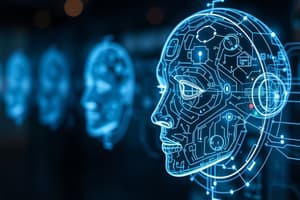Podcast
Questions and Answers
Which area involves ethical challenges associated with the fairness of hiring systems?
Which area involves ethical challenges associated with the fairness of hiring systems?
- AI and the Digital Divide: Governance and Ethical Issues
- Ensuring Fairness in AI-Powered Hiring Systems (correct)
- Addressing Bias in AI-Driven Judicial Systems
- AI Ethics in Surveillance Technologies
What is a significant concern related to AI in predictive policing?
What is a significant concern related to AI in predictive policing?
- Reducing crime rates effectively
- Improving police training programs
- Enhancing community trust
- Ethical Challenges in AI-Powered Predictive Policing (correct)
What role do ethics boards play in AI governance?
What role do ethics boards play in AI governance?
- Generating public awareness campaigns
- Monitoring and assessing ethical implications (correct)
- Creating laws for AI usage
- Developing software algorithms
In the context of AI and gender equality, what issue is often addressed?
In the context of AI and gender equality, what issue is often addressed?
Which topic explores bias in the context of the judicial system?
Which topic explores bias in the context of the judicial system?
What is a primary ethical challenge associated with AI in surveillance technologies?
What is a primary ethical challenge associated with AI in surveillance technologies?
What is a common issue faced by AI-driven judicial systems?
What is a common issue faced by AI-driven judicial systems?
Which of the following represents a concern regarding AI and gender equality?
Which of the following represents a concern regarding AI and gender equality?
What is a significant challenge in ensuring fairness in AI-powered hiring systems?
What is a significant challenge in ensuring fairness in AI-powered hiring systems?
What ethical concern is raised by AI in smart cities?
What ethical concern is raised by AI in smart cities?
Flashcards are hidden until you start studying
Study Notes
Ensuring Fairness in AI-Powered Hiring Systems
- AI-powered hiring systems often use algorithms that may perpetuate existing biases, leading to unfair discrimination against certain groups.
- Implementing bias detection tools and regular audits can help ensure fairness in hiring practices.
- Transparency in the decision-making process of AI can enhance trust and reduce perceived discrimination.
AI and Discrimination: Legal and Ethical Challenges
- Discrimination through AI can lead to legal complications under existing anti-discrimination laws and regulations.
- Ethical concerns arise when algorithms disproportionately disadvantage protected classes, raising calls for accountability and remedy.
- Ongoing debates focus on the balance between innovation and the protection of individual rights against AI misuse.
Addressing Bias in AI-Driven Judicial Systems
- AI can influence sentencing and bail decisions, potentially amplifying prejudices embedded in historical data.
- Initiatives are underway to create models that account for bias and promote equitable outcomes in judicial decision-making.
- The transparency of these systems is critical to maintaining public trust in justice.
Ethical Challenges in AI-Powered Predictive Policing
- Predictive policing utilizes AI to forecast criminal activity, raising concerns about reinforcing racial profiling and community mistrust.
- Ethical issues involve the accuracy of data sources and the potential for biased law enforcement practices.
- Public discourse is needed to balance safety and civil liberties in the implementation of such technologies.
Ethical AI in Smart Cities: A Comparative Analysis
- Smart city technologies leverage AI to improve urban management but can inadvertently lead to unequal access and surveillance.
- Differing government policies across regions create challenges for the ethical deployment of AI in enhancing urban living.
- Ensuring inclusivity and protecting citizens’ privacy is essential for developing ethical AI solutions in urban environments.
AI Ethics in Surveillance Technologies
- Surveillance technologies powered by AI have raised ethical questions about privacy, consent, and monitoring practices.
- The potential for misuse and overreach requires regulations to prevent infringements on civil liberties.
- Ethical frameworks are necessary to guide the development and use of surveillance technologies.
The Role of Ethics Boards in AI Governance
- Ethics boards serve as oversight bodies ensuring that AI systems adhere to ethical guidelines and societal values.
- Their role includes evaluating the implications of AI technologies and making recommendations for policy frameworks.
- Diverse representation within these boards can enhance the effectiveness of ethical evaluations.
AI and Gender Equality: Governance and Ethical Issues
- Gender biases in AI algorithms can impact employment and representation, necessitating governance strategies to promote equality.
- Ensuring diverse data sets and inclusive practices in AI development can help mitigate gender discrimination.
- Ongoing assessments of AI impacts on gender equality are crucial to achieve fair outcomes.
AI and the Digital Divide: Governance and Ethical Issues
- The digital divide highlights disparities in access to technology, which AI could exacerbate if not managed responsibly.
- Ethical governance is crucial to ensure that AI benefits are equitably distributed across different populations.
- Policies that promote digital literacy and access to technology can help bridge the gap caused by AI advancements.
Ethical AI in Consumer Electronics: A Global Overview
- Ethical considerations in consumer electronics include data privacy, environmental impact, and user consent.
- As consumer demand grows, manufacturers face pressure to ensure their AI-enabled devices function transparently and responsibly.
- Global cooperation is essential to establish common ethical standards for AI in consumer electronics, addressing differing cultural norms and regulations.
Ensuring Fairness in AI-Powered Hiring Systems
- AI-powered hiring systems often use algorithms that may perpetuate existing biases, leading to unfair discrimination against certain groups.
- Implementing bias detection tools and regular audits can help ensure fairness in hiring practices.
- Transparency in the decision-making process of AI can enhance trust and reduce perceived discrimination.
AI and Discrimination: Legal and Ethical Challenges
- Discrimination through AI can lead to legal complications under existing anti-discrimination laws and regulations.
- Ethical concerns arise when algorithms disproportionately disadvantage protected classes, raising calls for accountability and remedy.
- Ongoing debates focus on the balance between innovation and the protection of individual rights against AI misuse.
Addressing Bias in AI-Driven Judicial Systems
- AI can influence sentencing and bail decisions, potentially amplifying prejudices embedded in historical data.
- Initiatives are underway to create models that account for bias and promote equitable outcomes in judicial decision-making.
- The transparency of these systems is critical to maintaining public trust in justice.
Ethical Challenges in AI-Powered Predictive Policing
- Predictive policing utilizes AI to forecast criminal activity, raising concerns about reinforcing racial profiling and community mistrust.
- Ethical issues involve the accuracy of data sources and the potential for biased law enforcement practices.
- Public discourse is needed to balance safety and civil liberties in the implementation of such technologies.
Ethical AI in Smart Cities: A Comparative Analysis
- Smart city technologies leverage AI to improve urban management but can inadvertently lead to unequal access and surveillance.
- Differing government policies across regions create challenges for the ethical deployment of AI in enhancing urban living.
- Ensuring inclusivity and protecting citizens’ privacy is essential for developing ethical AI solutions in urban environments.
AI Ethics in Surveillance Technologies
- Surveillance technologies powered by AI have raised ethical questions about privacy, consent, and monitoring practices.
- The potential for misuse and overreach requires regulations to prevent infringements on civil liberties.
- Ethical frameworks are necessary to guide the development and use of surveillance technologies.
The Role of Ethics Boards in AI Governance
- Ethics boards serve as oversight bodies ensuring that AI systems adhere to ethical guidelines and societal values.
- Their role includes evaluating the implications of AI technologies and making recommendations for policy frameworks.
- Diverse representation within these boards can enhance the effectiveness of ethical evaluations.
AI and Gender Equality: Governance and Ethical Issues
- Gender biases in AI algorithms can impact employment and representation, necessitating governance strategies to promote equality.
- Ensuring diverse data sets and inclusive practices in AI development can help mitigate gender discrimination.
- Ongoing assessments of AI impacts on gender equality are crucial to achieve fair outcomes.
AI and the Digital Divide: Governance and Ethical Issues
- The digital divide highlights disparities in access to technology, which AI could exacerbate if not managed responsibly.
- Ethical governance is crucial to ensure that AI benefits are equitably distributed across different populations.
- Policies that promote digital literacy and access to technology can help bridge the gap caused by AI advancements.
Ethical AI in Consumer Electronics: A Global Overview
- Ethical considerations in consumer electronics include data privacy, environmental impact, and user consent.
- As consumer demand grows, manufacturers face pressure to ensure their AI-enabled devices function transparently and responsibly.
- Global cooperation is essential to establish common ethical standards for AI in consumer electronics, addressing differing cultural norms and regulations.
Studying That Suits You
Use AI to generate personalized quizzes and flashcards to suit your learning preferences.




